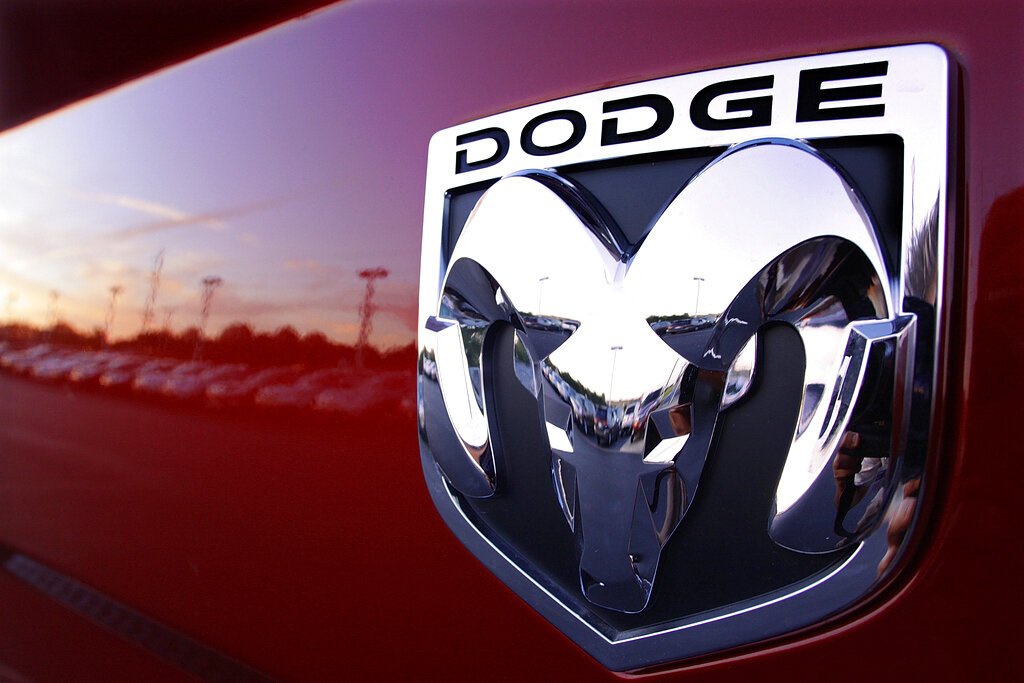Fiat Chrysler recalls 1.6M vehicles worldwide to fix Takata air bags

In this August 15, 2010, file photo the Dodge logo is seen on a new Dodge RAM 3500 Heavy Duty pickup trucks at sunset at a dealership in Springfield, Ill. Fiat Chrysler is recalling more than 1.6 million vehicles worldwide to replace Takata front passenger air bag inflators that can be dangerous. The recall covers the 2010 through 2016 Jeep Wrangler SUV, the 2010 Ram 3500 pickup and 4500/5500 Chassis Cab trucks, the 2010 and 2011 Dodge Dakota pickup, the 2010 through 2014 Dodge Challenger muscle car, the 2011 through 2015 Dodge Charger sedan, and the 2010 through 2015 Chrysler 300 sedan. (AP Photo/Seth Perlman, File)
DETROIT — Fiat Chrysler is recalling more than 1.6 million vehicles worldwide to replace Takata front passenger air bag inflators that can be dangerous.
Takata inflators can explode with too much force, hurling shrapnel into drivers and passengers. At least 23 people have died from the problem worldwide and hundreds injured.
The recall covers the 2010 through 2016 Jeep Wrangler SUV, the 2010 Ram 3500 pickup and 4500/5500 Chassis Cab trucks, the 2010 and 2011 Dodge Dakota pickup, the 2010 through 2014 Dodge Challenger muscle car, the 2011 through 2015 Dodge Charger sedan, and the 2010 through 2015 Chrysler 300 sedan.
It’s part of the largest series of automotive recalls in U.S. history. About 10 million inflators are being recalled this year. Already Ford, Honda and Toyota have issued recalls in the latest round.
Fiat Chrysler owners will be notified by letter and dealers will replace the inflators with safe ones. The company said it’s not aware of any injuries in vehicles involved in this recall. But it also said it has plenty of replacement parts and is urging people to get the repairs done.
“Recall service is free, we have replacement parts and dealers are ready to help,” Mark Chernoby, FCA’s head of safety for North America, said in a statement.
The recall includes 1.4 million vehicles in the United States.
Takata used the chemical ammonium nitrate to create a small explosion to inflate the air bags. But the chemical can deteriorate over time due to high humidity and cycles from hot temperatures to cold. The most dangerous inflators are in areas of the South along the Gulf of Mexico that have high humidity.
The Fiat-Chrysler recall is part of a phased-in replacement of Takata inflators being managed by the National Highway Traffic Safety Administration.
Owners can check to see if their vehicles have been recalled by going to https://www.airbagrecall.com and keying in license plate or vehicle identification numbers.
More than three years after the U.S. National Highway Traffic Safety Administration took over management of recalls involving Takata inflators, one third of the recalled inflators have not been replaced, according to an annual report last year from the government and a court-appointed monitor. The report said 16.7 million faulty inflators out of 50 million under recall have yet to be fixed.
Safety advocates said the completion rate should be far higher given the danger associated with the inflators.
The recalls forced Takata of Japan to seek bankruptcy protection and sell most of its assets to pay for the fixes. /kga